August 29, 2018
An Affair of Honor on the Western Frontier: The Pettis-Biddle Duel
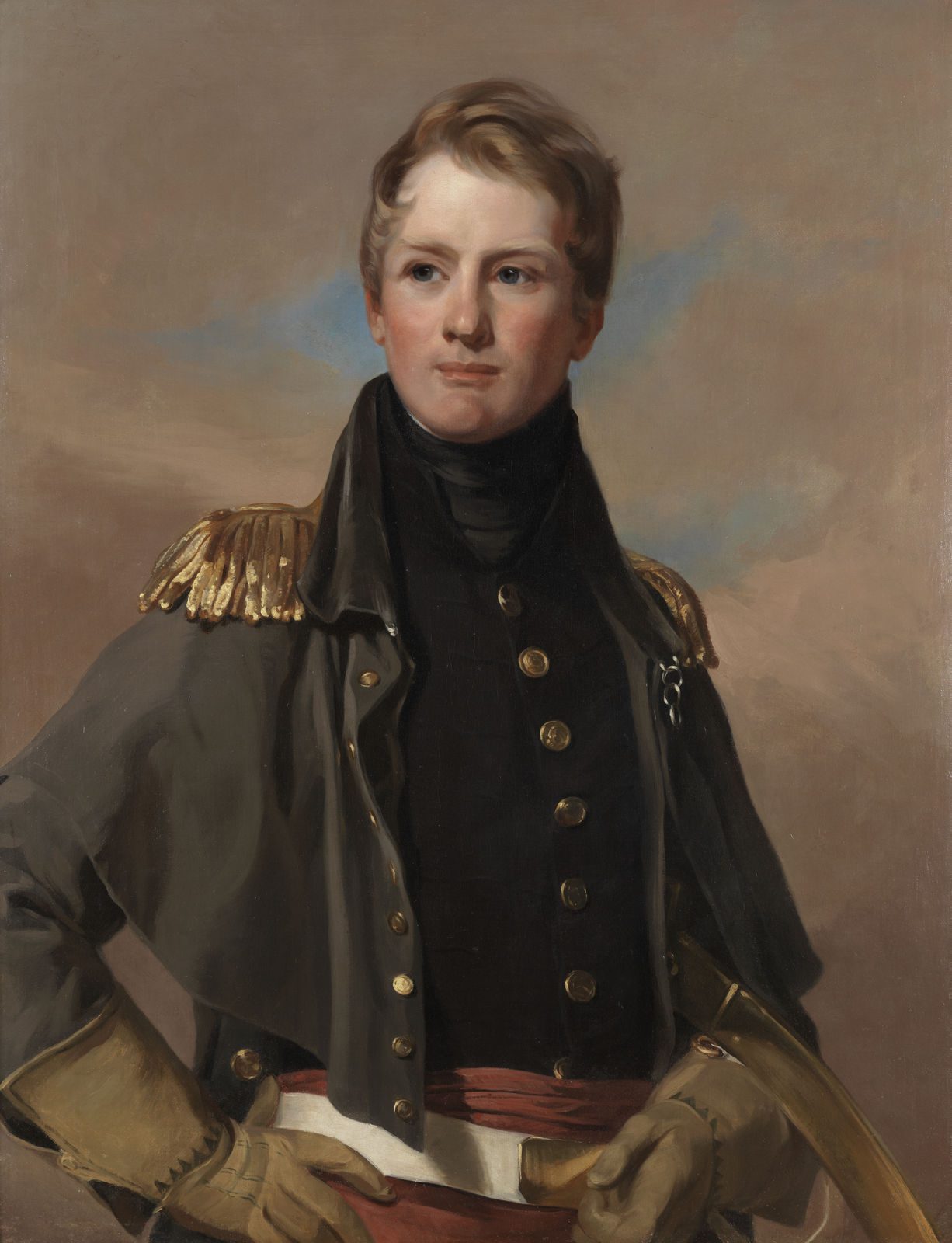
Thomas Biddle 1790-1831
To Charles Biddle, Esq., Nashville, Tennessee
St. Louis, 31 August 1831
My dear Sir,
You have no doubt heard of the death of your brother, Thomas, by a wound rec’d in a duel with Mr. Pettis – the distress with which it has overwhelmed us must be my excuse for not writing you sooner. The fatal duel in which both fell took place on the 26th [August, 1831]. Mr. Pettis deceased the 27th [August, 1831] and your brother on the 29th [August, 1831] – both were shot through the body.
From a letter by R. Graham to Charles Biddle, informing him of his brother, Thomas’ death.
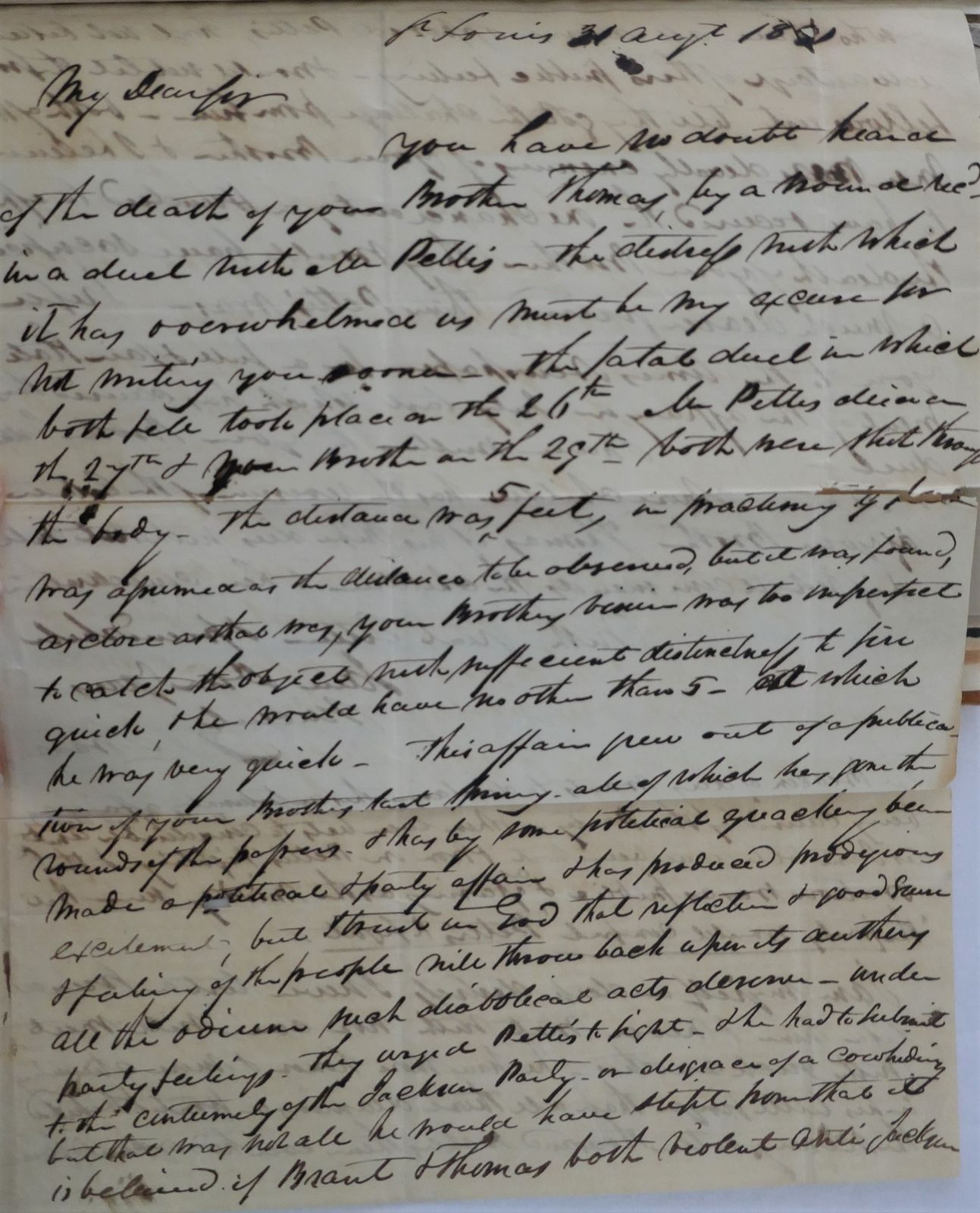
On Friday, August 26, 1831, two men from St. Louis, Missouri, and their seconds and surgeons, met to fight a duel on St. Louis’ dueling ground, Bloody Island, in the middle of the Mississippi River. Bloody Island was “a low slip of ground covered with cotton-wood and willows.” Dueling was illegal in both Missouri and Illinois at the time, but Bloody Island was St. Louis’ favored dueling ground as neither State claimed jurisdiction over it.
The two duelists were Missouri Congressman, Spencer Pettis, the challenger, and Major Thomas Biddle, the challenged. Spencer Pettis was, in addition to being Missouri’s member of the US House of Representatives, an attorney, a journalist, an ardent Jacksonian Democrat, and a protégé of Missouri’s US Senator Thomas Hart Benton. Thomas Biddle was a son of the wealthy, distinguished, and aristocratic Biddle family of Philadelphia, Pennsylvania. A major and paymaster in the US Army stationed in St. Louis, Thomas Biddle had distinguished himself for bravery as a young captain in command of an artillery unit during the War of 1812.
In 1831, St. Louis was the gateway to America’s western frontier. A rough-cut frontier town, St. Louis was “the big city” for fur trappers, soldiers, and settlers headed west. At the time, the Second Bank of the United States, young America’s defacto central bank, was a controversial institution, and nowhere more so than on the western frontier, where locally issued paper currency of often highly questionable value was very popular, especially for land purchases and speculation. The Second Bank of the United States’ insistence that locally issued bank notes be backed by specie (i.e., gold and silver) guaranteed that it would not be a popular institution on the western frontier. Added to Pettis’ dislike, Thomas Biddle had been instrumental in the establishment of a branch of the Second Bank of the US in St. Louis.
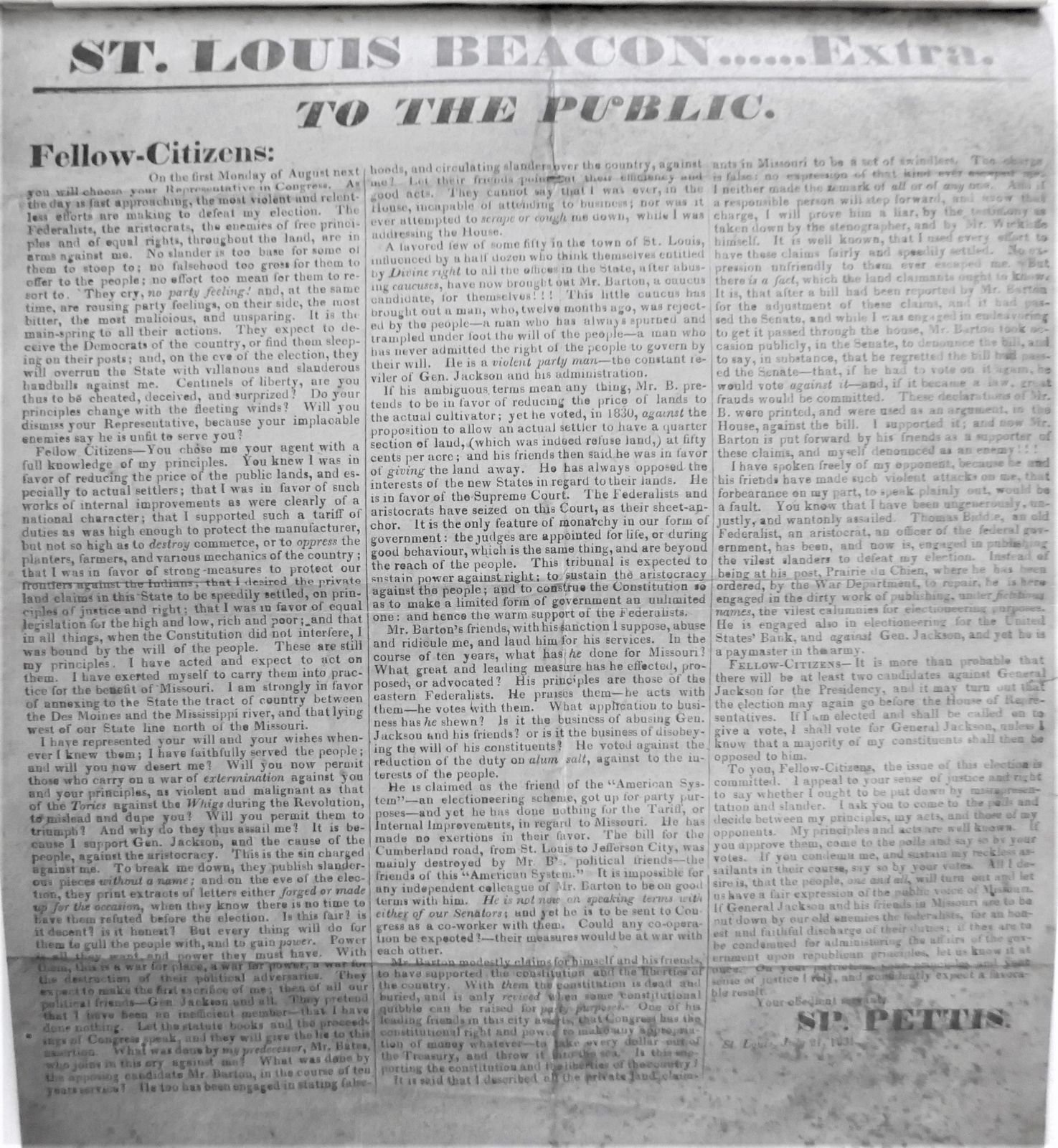
Spencer Pettis campaign letter, complaints against Biddle et al.
As a newspaper editor for the St. Louis Times, Spencer Pettis often wrote editorials critical of the banking and financial policies of the Second Bank of the United States, and of the Bank’s President, Nicholas Biddle, Thomas Biddle’s older brother. In his stump speeches while campaigning for Congress, Pettis would castigate both the Bank and Nicholas Biddle.
Knowing that the much hated Nicholas Biddle’s younger brother, Thomas, was a US Army paymaster stationed in St. Louis, Pettis would as one account put it, “amuse himself” by publishing barbs and attacks on Thomas Biddle in the St. Louis Times. Wisely, Thomas chose to ignore these published attacks until July 22, 1831 when Pettis published an attack questioning why Thomas’ wife had no children. This attack on Thomas’ manhood struck a little too close to home and he went off in search of Pettis in order to impose a well-deserved beating.
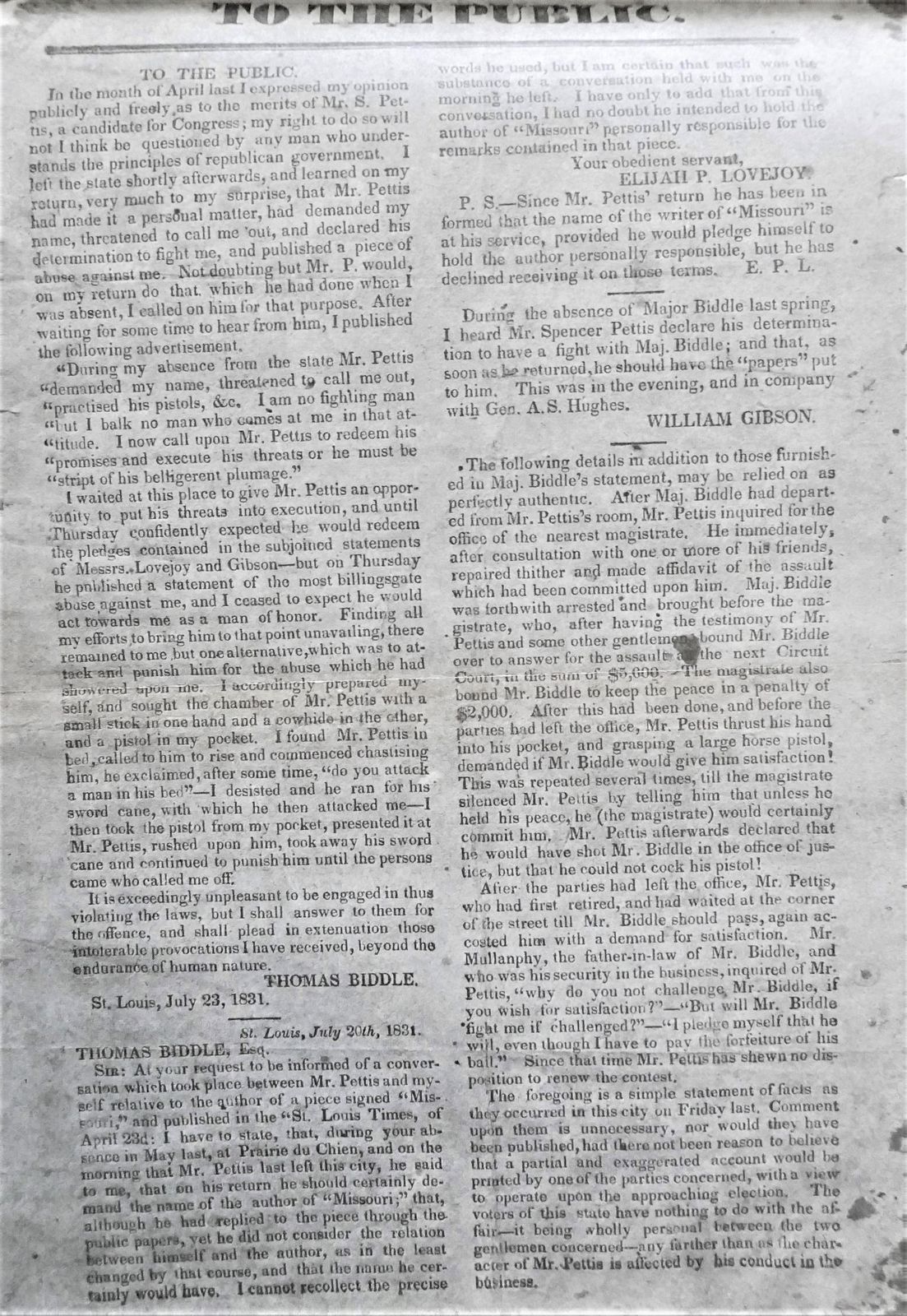
Thomas Biddle’s letter responding to insults by Pettis.
Pettis wanted to challenge Thomas Biddle to a duel immediately in the aftermath of the beating he had received. Pettis’ political mentor, US Senator Thomas Hart Benton, counseled him to wait until the August, 1831 Congressional off-year election was over and out of the way. Once the August election was over, the challenge for the duel was delivered by Pettis’ second, Captain Martin Thomas, on August 23, 1831. As the challenged party, Thomas Biddle had the choice of location, weapons, and terms of the duel. Biddle was extremely nearsighted, which may have accounted for his choice of weapons and terms: he chose Bloody Island, and pistols at five paces!
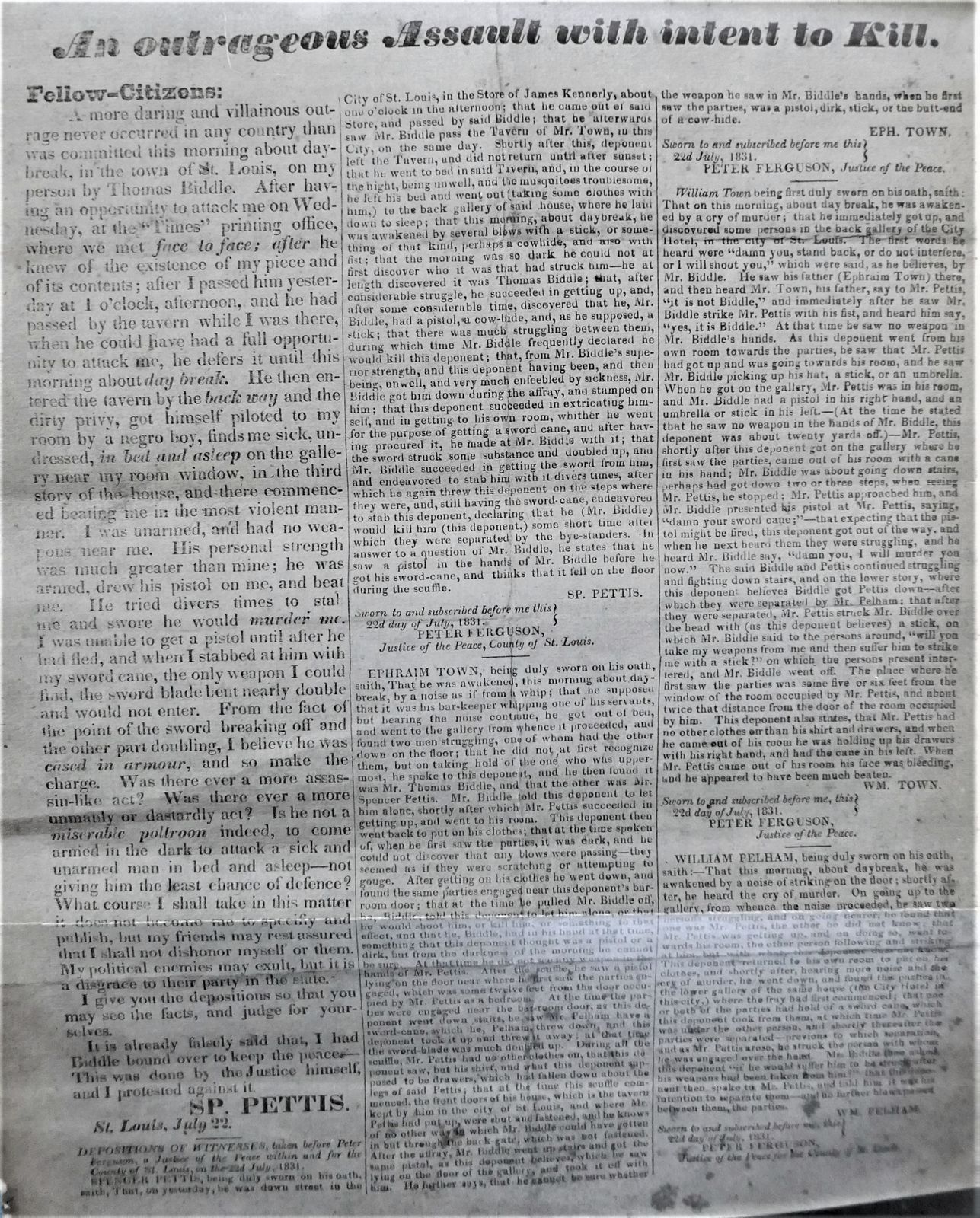
Pettis’ account of beating by Thomas Biddle.
Spencer Pettis and Thomas Biddle, with their seconds and surgeons, met for their fateful duel on Friday, August 26, 1831 on Bloody Island. News about the duel had created a sensation in St. Louis, and a large crowd gathered at the riverside, many with spyglasses, to watch the duel. The specified five feet was measured out, the two men exchanged a few words, extended forgiveness to each other, and then stood back to back, walked off their five paces, turned and fired at point blank range at each other. It was said that they stood so close to each other when they fired that the barrels of their guns overlapped. Both men fell mortally wounded.
Twenty-nine year old Spencer Pettis died from his wound the next day, Saturday, August 27, 1831 and was buried in St. Louis on Sunday, August 29. Thomas Biddle lingered for three days and died on Monday, August 29, 1831 and is buried in Calvary Roman Catholic Cemetery, St Louis. He was forty years of age.

Thomas & Anne Mullanphy Biddle mausoleum. St. Louis.
Written by Bert Wolfe
Photos, editing by Connie S. Griffith Houchins
Documents, newspaper articles in the Andalusia archives: Gerda Paumgarten Collection
Mausoleum photo Collection of the Library of Congress: HABS MO-124-B
Thomas Biddle (1790-1831) portrait, 1818 by Thomas Sully. Courtesy of the Pennsylvania Academy of the Fine Arts




